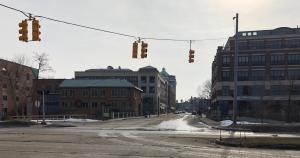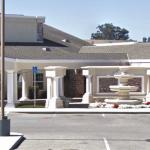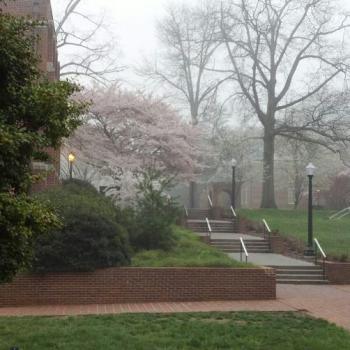This was a seminary assignment written for the Grand Traverse Bay Area in Theology and Ethics of Work at Asbury Theological Seminary (2017). Here are the professors’ guidelines for this talk.
The third and final assignment involves an imagined scenario (which I hope might be actualized for each of you at some point!) in which you’ve been asked to offer a 20 minute talk on the topic of “Bringing Ethics to the Workplace”. The assignment is to submit the written text for this talk. (A 20 minute talk probably equates to about 9-10 double-space pages of text.) For this assignment, you can choose either of the following two scenarios:
(a) A lunch meeting for fellow church members, in which your talk is expected to appeal to specifically Christian themes and resources.
(b) A lunch meeting for community business leaders, in which the person inviting you to talk has advised that your audience will be motivated more by pragmatic concerns than by religious interests.[1]
I share this piece hesitantly, but with their encouragement chiding me along:
“I hope you share it!”
They exhorted the class to do so repeatedly. So, despite challenges in this region, I pray to hold out the hope of greater dialogues for any real issues people may be facing. We all often find ourselves looking for answers in the same circles, and in need of expanding our network at times.
In part 1. Development & Holding to Our Values, we reviewed an interesting community narrative that we share, highlighting the ethics and entrepreneurial spirit of Perry Hannah with logging and commercial development. It’s also interesting to note that early on, this land was settled by Native Americans, Northern and Western Europeans, and Catholic priests who started missions, like Father Marquette.
In part 2, I discuss how our agricultural and commercial development has played out over time.
Part 1 concludes with the question that many are asking, “Can our region continue growing while still holding to our historic, small-town values?”
In part 2, we’ll consider the ethics of agricultural and commercial development in the region.
i. Agricultural Questions
Traverse City is considered a cherry capital, if not the cherry capital. However cherry trees take awhile to yield a harvest. In certain areas of our region, vineyards have sprung up, offering quicker yields. Some are already concerned about nightlife in our area, so vineyards add to questions about alcohol. However, our region is unique with very cold and snowy winters. We are a low-lying area on the bay and much of our soil is sand. We are far enough North (45th Parallel), that the circuit of the sun must be considered. The low lying land and moderate temperatures of the Old Mission and the Leelanau Peninsulas are the only areas that allow for vineyards. For a number of complicated reasons like this, we may never have thriving robust wineries.
Now we have hops, faster to grow and harvest than cherries or vineyards. A golf course Northeast of town was bought out and turned into a hops farm (Acme, MI). They were successful enough to start planting more. The hops farm is the first of its kind in our region. So if hops do well here, one has asked if it would potentially change our economy?
Would hops produce another boom like logging or cherries?
If so, what would our community look like on the other side of that boom? It seems like this is always a good long-term question to ask.
Someone else has pointed out that there are a number of agricultural issues with hops, much like grapes. In our region, it may be impossible to produce the kind of consistency from year to year to market a large scale product. Microbreweries might benefit, but major breweries will probably never enter the area. While one looks at nightlife and alcohol as a concern, another sees it as minor compared with darker regional issues.[2]
ii. Commercial Questions
Do we focus on alcohol and entertainment? Are we a party town . . . a resort town . . . a tourist trap? Are we headed in a negative direction? Again, these are really important long-term questions.
Did we once have a different reputation? One developer seems to question what path we are treading as a city. He questions our sense of balance.
What type of after hour opportunities and entertainment venues do we offer for those who have discretionary income?
Do you think his questions are warranted?
Others say we are not a party town. Alcohol is a minor problem compared to others we face. Not everyone approves of our nightlife options, but there are many other options for families in the heart of town.
We share a region with tribes and councils of Native Americans. As in other areas of our nation, our tribes elected to build casinos. Casinos provide jobs and some provide very high wages. As far as gambling goes, some people know their limits, but others do not. Casinos may not be the worst commercial enterprise we have, but one wonders how they will contribute to long-term regional development. One also wonders if we have lost sight of the equal opportunities Perry Hannah offered to Native Americans, so now they must generate commercial development for themselves.
What type of businesses do we want to attract?
TraverseCONNECT helps businesses and housing thrive in the heart of town. Luciani reports that over $4 million has been channeled into local businesses.[3] We have emerged from an era of different types of businesses. Many still remember abandoned warehouses, an icehouse, old gas stations, tire shops, a smelting plant, and factories that crowded downtown. Now that area is completely transformed.[4] We’ve maintained our beautiful downtown Front Street district with shops, bistros, entertainment venues, etc.[5]

Phoenix-Five, Skyline of Traverse City
at the corner of Grandview Parkway and Park St. | 01.21.18
We are not only experiencing commercial success on Front Street, which is on our bay front, but we are also in a season of economic growth in other commercial corridors.[6] Not all towns can say this!
William Cavanaugh addresses globalization as opposed to local culture. Even though we have some global commercial chains in the region, we have also held onto our heritage. My wife and I have lived in cities like this before, fairly picky about what big name companies are allowed in.
Locally owned businesses thrive here
There is a commitment to who we are and that is a guiding value, or what Cavanaugh calls a telos.[7]
[1] Also, for a detailed methodology of my research and writing of this piece, see part 1. Development & Holding to Our Values. [2] The agricultural question reveals different opinions that require research beyond the scope of this paper (i.e. Michigan Department of Agriculture and Rural Development or Michigan State University which has brought in experts to work with our city before). [3] Doug Luciani, “Building Community – For Today and the Future,” Traverse City Record-Eagle (April 30, 2017), http://www.record-eagle.com/news/business/doug-luciani-building-community-for-today-and-the-future/article_420f553b-e1bb-5efc-8407-8b59e5638f2a.html (accessed November 6, 2017).
[4] Luciani, “The Myth of ‘Overdevelopment,’” Traverse City Business News (September 2017), http://www.tcbusinessnews.com/the-myth-of-overdevelopment/ (accessed November 6, 2017).
[5] Our downtown is noticeable to world travelers as well. Last year, we hosted an Area Supervisor for Africa. He noted the architecture around certain areas of Front Street and the bay front, even the fireplace mantle in the coffee shop which he said looks exactly like the stonework in Europe. I listened as he discussed the architecture with some baristas, admiring our town. Name undisclosed, conversation with the author, September 3, 2018. [6] Luciani, “Small Town Character . . . or Small Town Politics?,” Traverse City Record-Eagle (October 18, 2017), http://www.record-eagle.com/news/business/doug-luciani-small-town-character-or-small-town-politics/article_8045f2dd-4677-523c-aa36-22c99a5b695f.html (accessed November 6, 2017).[7] William T. Cavanaugh, Being Consumed: Economics and Christian Desire (Grand Rapids, MI: Wm. B. Eerdmans, 2008), 65-68.













